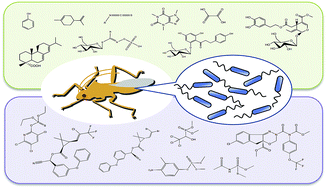Detoxifying symbiosis: microbe-mediated detoxification of phytotoxins and pesticides in insects
Abstract
Covering: up to 2018
Insects live in a world full of toxic compounds such as plant toxins and manmade pesticides. To overcome the effects of these toxins, herbivorous insects have evolved diverse, elaborate mechanisms of resistance, such as toxin avoidance, target-site alteration, and detoxification. These resistance mechanisms are thought to be encoded by the insects' own genomes, and in many cases, this holds true. However, recent omics analyses, in conjunction with classic culture-dependent analyses, have revealed that a number of insects possess specific gut microorganisms, some of which significantly contribute to resistance against phytotoxins and pesticides by degrading such chemical compounds. Here, we review recent advances in our understanding on the symbiont-mediated degradation of natural and artificial toxins, with a special emphasis on their underlying genetic basis, focus on the importance of environmental microbiota as a resource of toxin-degrading microorganisms, and discuss the ecological and evolutionary significance of these symbiotic associations.

- This article is part of the themed collection: The Chemistry of Symbiotic Interactions


 Please wait while we load your content...
Please wait while we load your content...